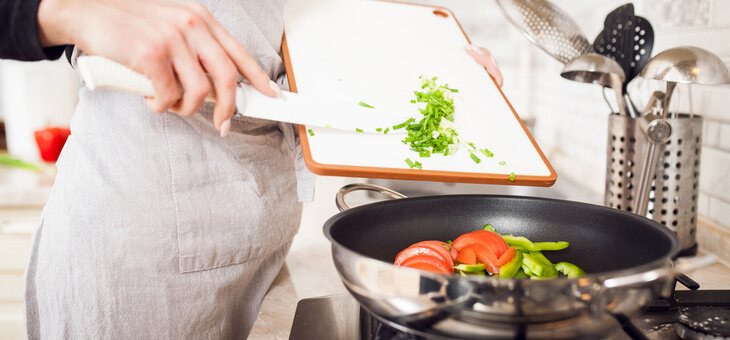It’s a well-established fact that what we eat has a direct link to our health. Healthy foods such as fruits, vegetables and whole grains are strongly linked to better physical and mental health.
But what may surprise you is that there also appears to be a link between cooking your own food and your mental wellbeing.
A study published by Edith Cowan University (ECU) has found that building confidence in the kitchen can lead to improved mental health, especially in males.
More than 650 participants undertook a seven-week healthy cooking course. While most benefited from taking part in the course, men particularly reported a significant increase in confidence afterwards.
Read: How focusing on the positives can help your mental health
Prior to the program, only 23 per cent of males had confidence in their cooking skills, compared with 77 per cent of women. By the end of the course, confidence levels for men and women was equal.
Cooking has a long history as a perceived gendered task. Now a divorced man, I was part of a marriage in which, despite efforts to avoid complying to gender stereotypes, my wife did virtually all of the cooking.
One of the main barriers for me in this area was a lack of confidence. Having grown up in a male-dominated household where Mum provided for us all via the kitchen, I never really developed any culinary skills or associated confidence.
Read: Top cooking tips you never knew
Now, more than a decade on from our separation (during which time I have succumbed to the temptation of takeaway and pre-cooked meals far too often), I am only just learning to overcome a lack of confidence in the kitchen, mainly through following simple recipes.
I realise now that I have been missing a key ingredient in ‘confidence’ all these years.
As part of the Institute for Nutrition Research program, researchers measured the effect on participants’ cooking confidence and self-perceived mental health, as well as their overall satisfaction around cooking and diet-related behaviours.
The results were very encouraging, with participants showing significant improvement in general health, mental health and subjective vitality immediately after the program. This improvement remained six months after completing the course.
Read: Baked Custard Tart
While there is a clear link between an improved diet and mental health, the study confirmed a link between confidence in the act of cooking and improved mental wellbeing. Even those who did not change their diets after completing the course reported improved mental health after the course’s conclusion.
This again aligns with my own personal experience. Even in following only relatively basic recipes, the sense of satisfaction and accomplishment is strong, particular at the moment of removing a self-prepared lasagne or golden-brown lemon cake from the oven.
Dr Joanna Rees, the study’s leading researcher, said the improved confidence levels shown by males could help provide a path to a gender balance in the kitchen.
“This change in confidence could see change to the household food environment by reducing the gender bias and leading to a gender balance in home cooking,” Dr Rees said.
If you enjoy our content, don’t keep it to yourself. Share our free eNews with your friends and encourage them to sign up.

